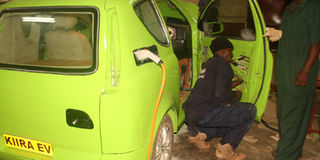Prime
Moving past Uganda’s electrical irony: behind the Kiira EV

Making final touches on the Kiira EV the day before Representation. PHOTOS BY Faiswal KASIRYE.
What you need to know:
The Makerere team behind Uganda’s first electric car say they plan on making a 28-seater solar panel bus in the next two years, to overhaul the transportation sector.
Three years back, teams from 30 universities from around the globe were brought together in Turin, Italy for a Vehicle Design Summit organised by the Massachusetts Institute of Technology (MIT).
The only African representative was none other than a team of 16 students from Makerere University, who would produce the power train, body electronics and communication network for an automobile they called the Vision 200.
Beyond the product itself, the summit aimed at inspiring students with big ideas to act independently and confront their lack of resources head-on. It worked. Just one year later, Makerere students had done it on their own – designed a fully functional vehicle that runs entirely on electricity. In Feb. 2011, they reached the proto-typing stage, made the final adjustments to the car, and this month, showcased it to the world.
Though the technology has been in the West for the last decade, most are still struggling to make the switch – largely due to the significantly higher costs involved over fueled vehicles.
But the team says they can do it cheaper, and more tailored to Uganda. With hikes in oil and gas prices and the walk-to-work protests in mind, the Makerere team says Uganda is exactly who should be thinking about renewable and more environmentally conscious modes of transportation for the future.
The minds behind the Kiira EV
The leaders behind Uganda’s first electric car can barely contain their excitement. From Makerere’s College of Engineering, Design, Art and Technology, the project’s manager, Paul Musasizi, speaks frankly about their success.
“None of us is really unique,” he says with a humble shrug. “We just need to make sure the enabling environment is there and champions will keep coming up.”
The team of 25 was made up of students and professors from the College of Engineering, Design, Art and Technology, Makerere University, for whom the car was their final-year project.
Their passion was a testament to the environment set up by Musasizi and the project’s principal investigator, Prof Sandy Togboa Tickodri.
“Having achieved a ‘vocational approach’ to teaching was just as rewarding as the electric car itself,” Prof. Tickodri said. “I’ve participated in starting a generation of human resource of graduates who can undertake any job, any assignment anywhere – a level of training which can allow them to work in China, the US, wherever. Before, that wasn’t possible.”
What’s more, the duo say incorporating this approach across disciplines would allow Uganda to use developing technologies to its best advantage by tailoring them to the country’s specific needs. “If we did this in agriculture, where we have resources in abundance, it would be a real step forward for this country,” Prof. Tickodri said.
Next on the engineers’ docket is a solar-paneled 28-seater bus, which they expect to be able to produce within two years time.
“We are targeting the large population because we are trying to reduce the congestion in taxis. Besides, we want to save our environment by making eco-friendly transportation. Our core factor is technology that can protect our environment,” Mr Musasizi said. “And, one of the things that is a major economic enabler in any country is public transport.”
Getting to another prototype isn’t the problem – the group had already been awarded Shs25b over five years for their research and product development from President Museveni himself in late 2009.
But rolling out a fleet of the buses within two years will require a number of things to fall in place. Prof. Tickodri says with 50 acres of land and Shs30b, the team could effectively build a centre for research in transportation technology and even an assembly line.
Commercialising the electric buses will require private partners to come on board, he says, as well as a more reliable and accessible electricity supply.
Power woes
The irony of Uganda producing its first electric car when the country has suffered an erratic power supply for months now is not lost on state minister for energy Simon D’Ujanga. “For an electric automobile you need constant power, and at the moment we are a little bit challenged with lack of power,” he said. He insisted the country’s power will be on track within six months, with the Bujagali hydropower programme finally being commissioned.
And within two years, he says the country’s power grid could be extended to support the electric cars he hopes to see in Uganda’s future. “It’s exciting,” he says, adding that the ministry would “definitely” be interested in working with the Makerere team to fully realise the potential of what’s to come.




